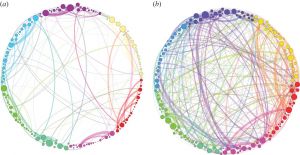Psychedelics
The mind is a neurochemical machine it has so many inputs it evolved the subconscious to stop too much noise overwhelming the system. The word Psychedelic means mind-manifesting, i.e. it is taking some of these subconscious inputs and opening it up to the conscious mind. They work like a switch, once present in the system they switch of the inhibitory system and systems become conscious. The effect is that millions of years of heuristics which created the brain are opened up. Only those which were promoted to the conscious mind were accessible to you, now you can see what is under the hood. However, as we have a limited awareness i.e. processing power it is different to normal consciousness as all of the inputs which had been subdued are now switch on and you are only built to pay attention to one or two things at one time. So the experience is often incapacitating and thus makes us vulnerable.
Psychedelic Comparison
Much of the psychedelics have the same effect[1][2][3], however there are some notable differences
Side effects
Mescaline causes stomach cramps.
Duration
- DMT - 30 minutes.
- Psilocybin 3-6 hours.
- Ayahuasca 4-7 hours.
- LSD 6-11 hours.
References
- ↑ Holze, F., Ley, L., Müller, F. et al. Direct comparison of the acute effects of lysergic acid diethylamide and psilocybin in a double-blind placebo-controlled study in healthy subjects. Neuropsychopharmacol. 47, 1180–1187 (2022). https://doi.org/10.1038/s41386-022-01297-2
- ↑ Carbonaro TM, Johnson MW, Hurwitz E, Griffiths RR. Double-blind comparison of the two hallucinogens psilocybin and dextromethorphan: similarities and differences in subjective experiences. Psychopharmacology (Berl). 2018 Feb;235(2):521-534. doi: 10.1007/s00213-017-4769-4. Epub 2017 Nov 7. PMID: 29116367; PMCID: PMC6645364.
- ↑ Comparison of the Reactions Induced by Psilocybin and LSD-25 in Man, From the National Institute of Mental Health, Addiction Research Center, U. S. Public Health Service, Lexington, Kentucky by HARRIS ISBELL 1959
